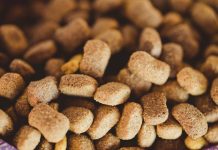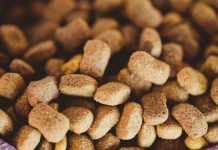Welcoming a new puppy into your home is an exciting adventure filled with playful moments and endless affection. As a responsible pet parent, one of the most important gifts you can offer your furry friend is a nutritious, balanced diet that supports their growth and well-being. In today’s world, with a growing emphasis on health and sustainability, crafting a puppy diet using natural ingredients is not only beneficial for your pup but also aligns with a holistic lifestyle. This article will guide you through the essentials of creating a balanced diet for your puppy, using wholesome, natural ingredients that cater to their unique nutritional needs. Whether you’re a seasoned pet owner or new to the puppy parenting journey, we’re here to help you make informed, thoughtful choices that contribute to a happy, healthy life for your four-legged companion.
Choosing Nutrient-Rich Ingredients for Your Puppys Growth
When crafting a diet that supports your puppy’s development, it’s essential to focus on ingredients that are rich in nutrients. Puppies require a balanced blend of proteins, fats, carbohydrates, vitamins, and minerals to fuel their rapid growth and boundless energy. Begin with high-quality protein sources such as chicken, turkey, or fish, which are crucial for building strong muscles. Include omega-rich oils like salmon or flaxseed oil to support brain development and maintain a healthy coat. Additionally, incorporate a variety of fresh vegetables like sweet potatoes, carrots, and peas, which provide vital vitamins and fiber.
- Lean Meats: Chicken, turkey, and fish are excellent sources of protein.
- Healthy Fats: Salmon oil and flaxseed oil support cognitive function and skin health.
- Vibrant Vegetables: Sweet potatoes, carrots, and peas offer essential vitamins and minerals.
By selecting nutrient-dense ingredients, you’re ensuring that your puppy receives a diet that supports optimal growth and development. Always remember to consult with your veterinarian to tailor the diet to your puppy’s specific needs and monitor their progress as they grow.

Crafting Homemade Meals with Love and Care
Creating a nourishing diet for your puppy is a delightful journey that combines care and creativity. To ensure your furry friend grows up strong and healthy, focus on integrating natural ingredients that offer balanced nutrition. Puppies, much like humans, thrive on a diverse diet that includes essential nutrients. Here’s a guide to help you craft their meals with love:
- Proteins: Opt for lean meats like chicken, turkey, or beef. These should be well-cooked and cut into small, digestible pieces. Eggs are also a great source of protein and can be served scrambled or boiled.
- Carbohydrates: Incorporate healthy grains such as brown rice or quinoa, which provide energy and fiber. These should be cooked thoroughly to aid digestion.
- Vegetables: Add a splash of color and nutrients with carrots, sweet potatoes, and spinach. These should be steamed or boiled to ensure they’re gentle on your puppy’s stomach.
- Fats: Healthy fats are vital for your puppy’s brain development and coat health. Consider adding a teaspoon of olive oil or fish oil to their meals.
Mix these components with a dash of love, and you’ll have a meal that not only meets your puppy’s nutritional needs but also fosters their growth and happiness. Remember, every pup is unique, so adjust portions and ingredients based on their individual needs and any recommendations from your veterinarian.

Incorporating Essential Vitamins and Minerals Naturally
Ensuring your puppy receives a diet rich in essential vitamins and minerals is crucial for their growth and development. While commercial puppy foods often contain these nutrients, incorporating them through natural ingredients can offer additional health benefits. Leafy greens like spinach and kale are packed with iron and calcium, essential for strong bones and teeth. Carrots and sweet potatoes are excellent sources of beta-carotene, which is vital for healthy vision and immune function. Blueberries and pumpkin can provide antioxidants that support overall well-being and help fight free radicals.
To create a naturally balanced diet, consider adding a variety of proteins, such as lean chicken, turkey, or fish, which are rich in essential amino acids. Eggs can also be an excellent addition, providing high-quality protein and essential fatty acids. Don’t forget about whole grains like brown rice or quinoa, which can supply energy and fiber. When preparing these meals, ensure they are cooked thoroughly and served in appropriate portions to meet your puppy’s nutritional needs. This approach not only supports their physical health but also makes mealtime an enjoyable experience for your furry friend.

Monitoring and Adjusting Your Puppys Diet for Optimal Health
To ensure your puppy thrives, it’s crucial to regularly monitor their dietary needs and make adjustments as they grow. Puppies have specific nutritional requirements that change as they age, and using natural ingredients is a great way to meet these needs. Begin by observing your puppy’s energy levels, coat condition, and overall demeanor. If you notice any signs of sluggishness or dull fur, it might be time to tweak their diet. Regular vet check-ups are also essential to tailor the diet based on professional health assessments.
Here are some signs that your puppy’s diet might need adjusting:
- Weight Changes: Sudden weight gain or loss can indicate dietary imbalances.
- Stool Quality: Monitor for changes in consistency or frequency, as this can reflect digestive health.
- Behavioral Shifts: Unusual lethargy or hyperactivity may be linked to nutritional deficiencies or excesses.
Incorporate a variety of natural ingredients like fresh meats, vegetables, and grains to maintain a balanced diet. Adjust portions and ingredient ratios based on your puppy’s specific needs, ensuring they receive the right mix of proteins, fats, and carbohydrates. Remember, a well-monitored diet is the foundation of a healthy, happy puppy.
















